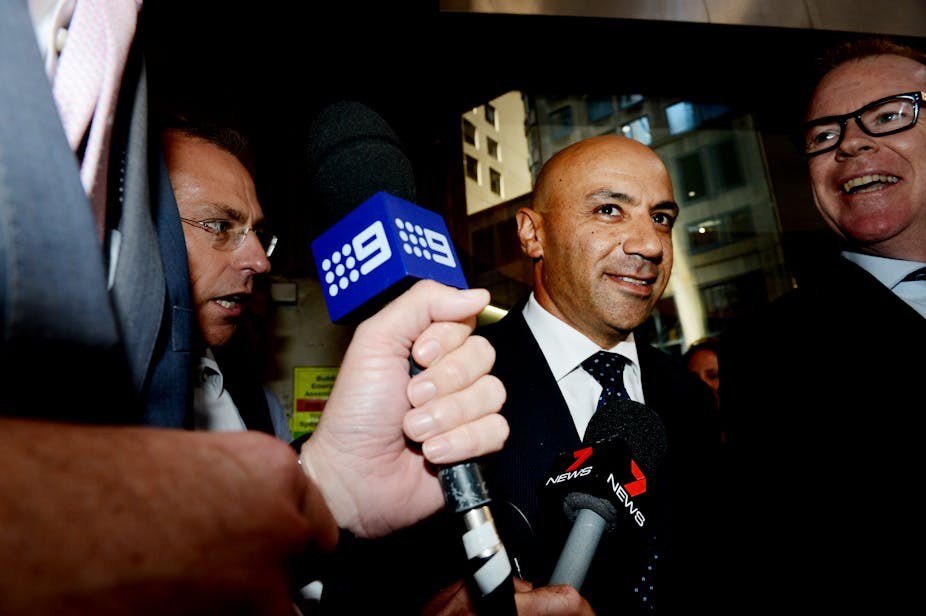When the Obeid family took the stand at the New South Wales Independent Commission Against Corruption (ICAC) yesterday, the Australian media took more notice than it previously had.
This is perhaps not surprising, considering the notoriety of the Obeids in New South Wales. Former state Labor MP and patriarch Eddie Obeid (senior) has a reputation as a right faction powerbroker within the ALP, due largely to his influential role in selecting the past three New South Wales ALP Premiers.
But politics is not the only calling for the Obeids. Eddie Senior, his wife Judith, and five business partner sons, Moses, Paul, Gerard, Damien, and Eddie Junior, also have stakes in industries such as mining, construction and exports.
Yesterday, the Obeids faced ICAC upon allegations of insider trading. The accusation is that they misused information provided by former state Minister for Resources, Ian Macdonald, to turn $200,000 worth of investments into an estimated $100 million profit.
This was allegedly achieved through the buying (and subsequent selling) of property in the Upper Hunter region of NSW prior to Macdonald granting leases to mining companies to allow exploration for coal in the area. Moses Obeid has admitted to acting as a “point of contact” between Macdonald and the rest of the Obeid family, with Macdonald providing Moses with a list of names of miners interested in investing in the region.
The Obeids did not just stand to benefit from selling property in the region. One of the mining companies that bought into the Upper Hunter after Macdonald’s tendering of leases – Cascade Coal – is 25% owned by the Obeids.
Due to the high monetary value of the alleged offence and the high profile of the Obeid family in New South Wales, it is not entirely surprising that this case has caught the media’s eye.
When considering the history of corruption in Australia, however, how bad are the Obeid allegations really?
A perception seems to exist that Australia has been “cleaned up” following the corruption scandals of the 1980s and 1990s such as the Greiner dismissal and Queensland’s Fitzgerald Inquiry. The idea goes that the numerous inquiries into political and police corruption have effectively changed national attitudes towards corruption and misconduct. If the allegations being investigated in the Obeid/Macdonald case are made out, Australia isn’t as clean as people think.
Corruption is defined by international organisations and academics alike as the misuse of public office for private gain. In December of last year, Victorian MP Geoff Shaw was found to be a key figure in a “cash for access” scheme, in which Liberal Party funds were generated through payments made by property developers and business figures to gain access to MPs at private events. In the same month, allegations about New South Wales Customs hit the media, in which customs officials have allegedly been using their position to import and traffic drugs, tobacco and weapons.
So that’s two examples from the past two months. If you extend the search parameter beyond eight weeks, more cases emerge.
In order for anti-corruption efforts to be successful, there needs to be a greater awareness of what corruption actually means.
But we also must be clear on what does not constitute corruption.
Taking the above examples, the alleged acts by New South Wales customs officials and Geoff Shaw, are clear examples of corruption.
Similarly, as the Obeid/Macdonald case relates to alleged events occurring when both men were in office, there is scope for their actions to be classified as corruption – but with evidence yet to be heard and the case still underway, this is yet to be determined.
Earlier this month, much attention was given in Victoria to the case involving the wife of state opposition leader Daniel Andrews and her involvement in a car crash, after which she was not breathalysed.
With no evidence found to suggest that either Andrews or his wife used their position to force police to ignore procedure, this cannot be said to constitute corruption. In which case it’s worth asking whether the incident was deserving of the five-page spread it received in the Herald Sun.
The Obeid case is sensational in its nature, but not alone in existence. Corruption in Australia is more widespread than you might think. What is important is how it is reported, and how anti-corruption policy is shaped. Media accountability does not fall into the shadows here. More scrutiny must be given to politicians and public officials, but greater accuracy is needed when it comes to understanding corruption.
The Obeid/Macdonald case presents a significant opportunity to ICAC. While it does not act as a prosecutorial body (rather it hears cases then passes the evidence on to prosecutors and parliament), with the national media coverage this case is attracting, the commission is able to draw attention to the importance of effective anti-corruption policy in Australia.
ICAC should use its media time wisely, to ensure it can fight future corruption cases that don’t sell quite so many newspapers.

